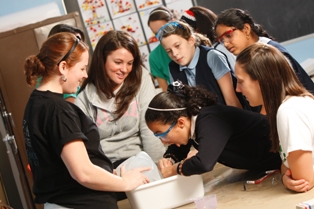Friday's Five is a feature every week where I pick a new topic and list five items that I think fit best. Then I ask you to share your thoughts in the comment section. For an archive of past topics, check the Friday's Five Page.
I have to admit that I had a tough time deciding on a topic for this week's Friday's Five. I'd imagine that all writers go through stretches where they just don't feel as creative or motivated as usual. I finally decided to write about five of my favorite curriculum topics to teach because every time these subjects come up in class I get reinvigorated. They may not be the most important things for 5th graders to learn, but for me, teaching these things is like a shot of instant motivation.
 |
| Photo Credit: Merrimack College |
- Idioms - I know that you are probably laughing at me right now. I won't take it to heart. I've got thick skin. For the most part, native English speakers never really think about the literal meaning of the idioms we use every day. When I ask my 5th graders to look at idioms from the point of view of someone learning English for the first time, there are always plenty of chuckles as they imagine someone who's eyes really are bigger than their stomach, actually paying through your nose, and how horrible it would be to actually be bent out of shape. They love to draw pictures of the literal meanings of some common idioms.
- The Bill of Rights - If you've read my blog before it shouldn't come as a shock that I believe that educating students in civics is vital to the success of our democracy. The magic happens when students start believing that their understanding is vital to the success of our democracy. That seems to happen when we start discussing the Bill of Rights every year. About 10 years ago I picked up a paper back book on the Constitution at a yard sale for a quarter. It's got notes and markings all over it. It's the best 25 cents I've ever spent. Inside that book are real and hypothetical Supreme Court cases on each article and amendment to the Constitution. Students love playing Supreme Court - hearing the facts of the cases, debating how the case relates to the Constitution and comparing their opinions to the actual rulings.
- Graphing and Statistics - When I was growing up in New York during my elementary school years I loved collecting and trading baseball cards. I was fascinated by the statistics on the backs of the cards and what they meant. When we work with data in class I try and inspire that same passion for my students. Teaching them how powerful data is when trying to get others to see one's point of view always helps. Introducing graphing to my students also allows me to dump 20 lbs. of pasta all over the floor in one of my absolute favorite lessons, Pasta Mining.
- The American Revolution - The events of the 1760's and 1770's in North America make up a great narrative. Like a great Hollywood movie there are interesting characters and an underdog overcoming seemingly insurmountable obstacles to emerge victorious. In addition, the number of resources available about the American Revolution makes it easy to teach students several of the things every social studies students should be learning that I blogged about last week.
- Fractions - Many reports have come out in recent years showing that both high school students and American teachers have trouble understanding fractions. It's because of the way we teach math as a series of rules to be memorized instead of a series of concepts that need to be understood. The great thing about teaching fractions is how easy it is to have the students work with visual models and manipulatives. Playing with "stuff" is much more fun than learning "stuff."
Now it's your turn. What are the topics in your curriculum that you love to teach? What is it about them that makes them fun for you? Please share in the comment section below, and pass the post along to others via Twitter, Google+, Plurk, or Facebook so that we can hear their comments as well. There's also an e-mail button on the bottom if you wish to share that way.







